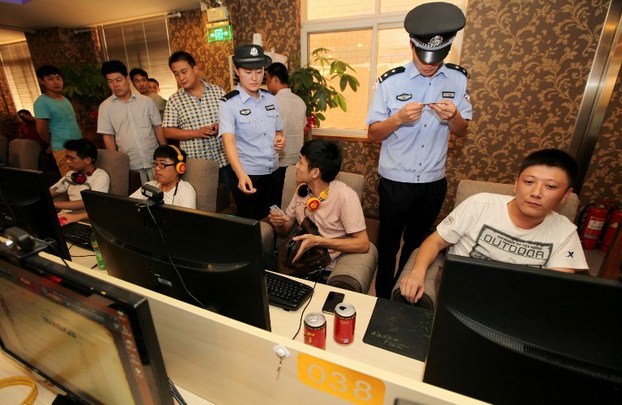
Police check the ID cards of netizens at an Internet cafe in Shandong province, July 31, 2013. ImagineChina
China’s police force has launched a whistleblower website targeting people who spread “rumors” online in a further bid to control what the country’s 700 million internet users see and post online.
The ministry of public security and the Twitter-like social media platform Sina Weibo launched the National Platform to Refute Rumors to garner “tip-offs” from those wishing to report “false” online information, official media reported.
Anyone found “spreading rumors” on Sina Weibo will have their accounts terminated and may be investigated by police, according to the Global Times, which has close ties to the ruling Chinese Communist Party.
Activists said the website is aimed at ensuring that ordinary citizens don’t use social media to challenge the official version of events.
“Historically, the police just want to suppress the truth and persecute any organizations that support democracy and freedom of speech,” Sichuan-based activist Huang Qi, who founded the Tianwang rights website, told RFA.
“It’s ridiculous to imagine that such an evil organization would suddenly turn into a defender of the truth; it will just turn into a laughing stock,” he said.
A netizen who gave only a nickname, Xiao Biao, agreed, blaming frequent online rumors on a lack of press freedom in China.
“What they are doing is ridiculous; it’s an attempt to suppress and cover up information,” he said. “In a country with freedom of speech and freedom of the press, you would never get so many rumors flying about in the first place.”
“These rumors spring from the absolute power of the government, which has suppressed freedom of speech and of the press,” he said.
‘Positive and healthy’ internet
The new website, which follows a campaign by President Xi Jinping for a “positive and healthy” internet, isn’t the first collaboration between police and major internet service providers.
Last year, Beijing announced it would station specialist police officers in major internet companies to help protect against hacker attacks, “violent terrorist information,” fraud and data theft, pornography and gambling.
But police have also targeted people who used social media to send out unofficial and unedited information about breaking news stories.
Last August, authorities in the eastern Chinese province of Anhui jailed veteran activist Shen Liangqing on public order charges after he retweeted a social media post about the devastating chemical warehouse explosions in Tianjin.
Shen, a former state-prosecutor-turned-whistle-blower who wrote a book detailing abuses under the ruling party’s internal disciplinary regime, was handed a nine-day administrative sentence by police in the provincial capital Hefei.
And China’s draconian internet agency, the Cyberspace Administration, said it suspended more than 360 social media accounts after the blasts rocked Tianjin.
Last October, three people in the eastern province of Shandong were also jailed briefly for sending out tweets about an explosion at a chemical factory near their homes in Zibo city that wasn’t reported by the country’s tightly controlled media.
The three were accused of sending out tweets saying that there had been a large explosion at the Zibo Dongda Chemical Industries after local residents heard a loud blast on Tuesday evening, in the absence of any official explanation for the blasts.
Last year, police said they had arrested more than 15,000 people in recent year for cyber crimes.
Reported by Xin Lin for RFA’s Mandarin Service. Translated and written in English by Luisetta Mudie.
Source: http://www.sampsoniaway.org/fearless-ink/2016/05/13/harry-wu-an-amazing-survivor/
